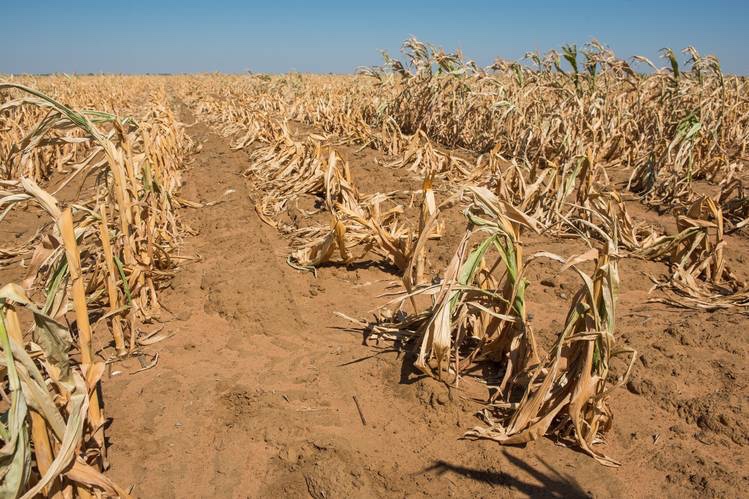Informer
JF-Expert Member
- Jul 29, 2006
- 1,599
- 6,669
Jan 21, 2017 - The Star

President Uhuru Kenyatta has banned maize exports to the country with immediate effect.
This follows ravaging drought in many parts of the country that has affected the grain reserves.
Uhuru said a stern action will be taken against those who will be found exporting grain or hoarding stocks in order to sell at inflated prices during the dry season.
''We will not allow any trader to buy maize in large amount so as to store and eventually cash in following the ravaging drought in the country,'' the president said on Friday during a tour of Isiolo, which is among the drought stricken counties in the country.
According to the government, drought is worst in the Coastal region, specifically in Kilifi, Kwale, Tana River and Taita Taveta counties.
Other counties that have been hit include Kitui, Garissa, Mandera, Marsabit, Makueni, Samburu and Wajir.
Uhuru said the national government will revise its budget in order to address the drought menace in the country.
“I'm also urging county governments to relook their budgets in order to cushion Kenyans against the effects of the drought,” he said.
The country consumes about 29 million bags of maize every six months but there is biting shortage due to poor rains which reduced harvests and affected stocks in the national grain reserve in the past season.
Reports from the Ministry of Agriculture indicates the country has 21 million bags of maize as of now, translating to a deficit of eight million bags.
The stocks include those held by farmers and the Strategic Grain Reserve and can only last until June.
Agriculture Cabinet Secretary Willy Bett however said there is no plan to import maize since there is enough stock of other types of foods grains and legumes.
The CS said the government will purchase two million bags of maize from farmers before end month to increase the stocks.
The government is offering Sh3000 for a bag of maize, which the CS said is “fair enough”.
“So far, we have bought 1.4 million bags of 90 kilogrammes each,” he said noting purchases would have been higher if farmers were not hoarding maize.

President Uhuru Kenyatta has banned maize exports to the country with immediate effect.
This follows ravaging drought in many parts of the country that has affected the grain reserves.
Uhuru said a stern action will be taken against those who will be found exporting grain or hoarding stocks in order to sell at inflated prices during the dry season.
''We will not allow any trader to buy maize in large amount so as to store and eventually cash in following the ravaging drought in the country,'' the president said on Friday during a tour of Isiolo, which is among the drought stricken counties in the country.
According to the government, drought is worst in the Coastal region, specifically in Kilifi, Kwale, Tana River and Taita Taveta counties.
Other counties that have been hit include Kitui, Garissa, Mandera, Marsabit, Makueni, Samburu and Wajir.
Uhuru said the national government will revise its budget in order to address the drought menace in the country.
“I'm also urging county governments to relook their budgets in order to cushion Kenyans against the effects of the drought,” he said.
The country consumes about 29 million bags of maize every six months but there is biting shortage due to poor rains which reduced harvests and affected stocks in the national grain reserve in the past season.
Reports from the Ministry of Agriculture indicates the country has 21 million bags of maize as of now, translating to a deficit of eight million bags.
The stocks include those held by farmers and the Strategic Grain Reserve and can only last until June.
Agriculture Cabinet Secretary Willy Bett however said there is no plan to import maize since there is enough stock of other types of foods grains and legumes.
The CS said the government will purchase two million bags of maize from farmers before end month to increase the stocks.
The government is offering Sh3000 for a bag of maize, which the CS said is “fair enough”.
“So far, we have bought 1.4 million bags of 90 kilogrammes each,” he said noting purchases would have been higher if farmers were not hoarding maize.
 Anakuambia usiige ya wanasiasa wa Tanzania ya kutoa matamko yasio eleweka. Kenya na nyinyi hili linaweza kuvaliwa suruali na wanasiasa mkapa mkaaza kuona nyota tatu tatu.
Anakuambia usiige ya wanasiasa wa Tanzania ya kutoa matamko yasio eleweka. Kenya na nyinyi hili linaweza kuvaliwa suruali na wanasiasa mkapa mkaaza kuona nyota tatu tatu.